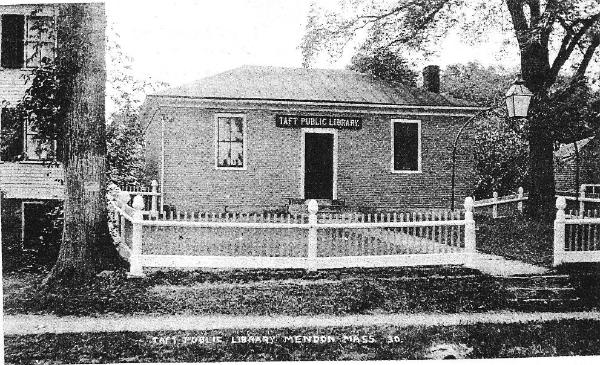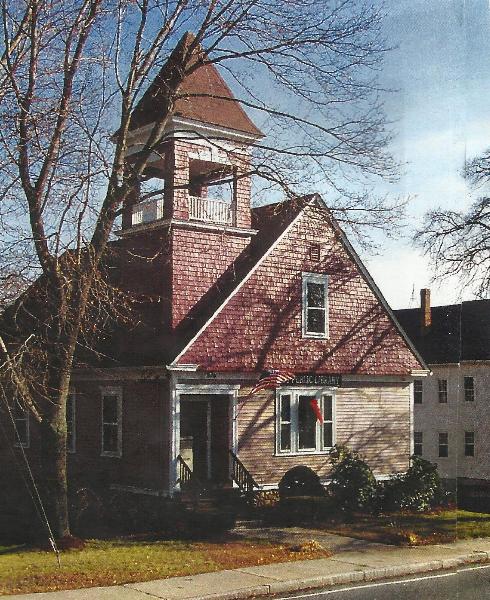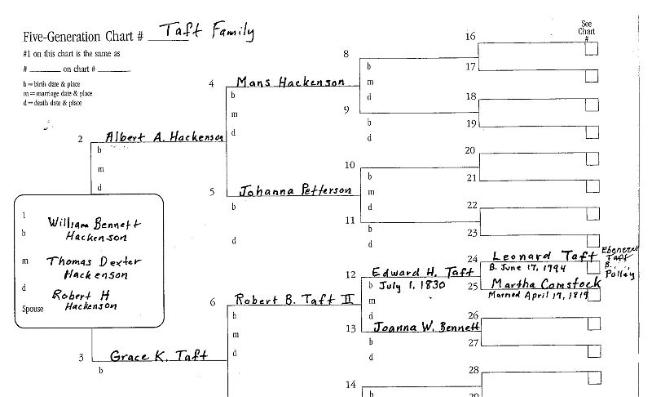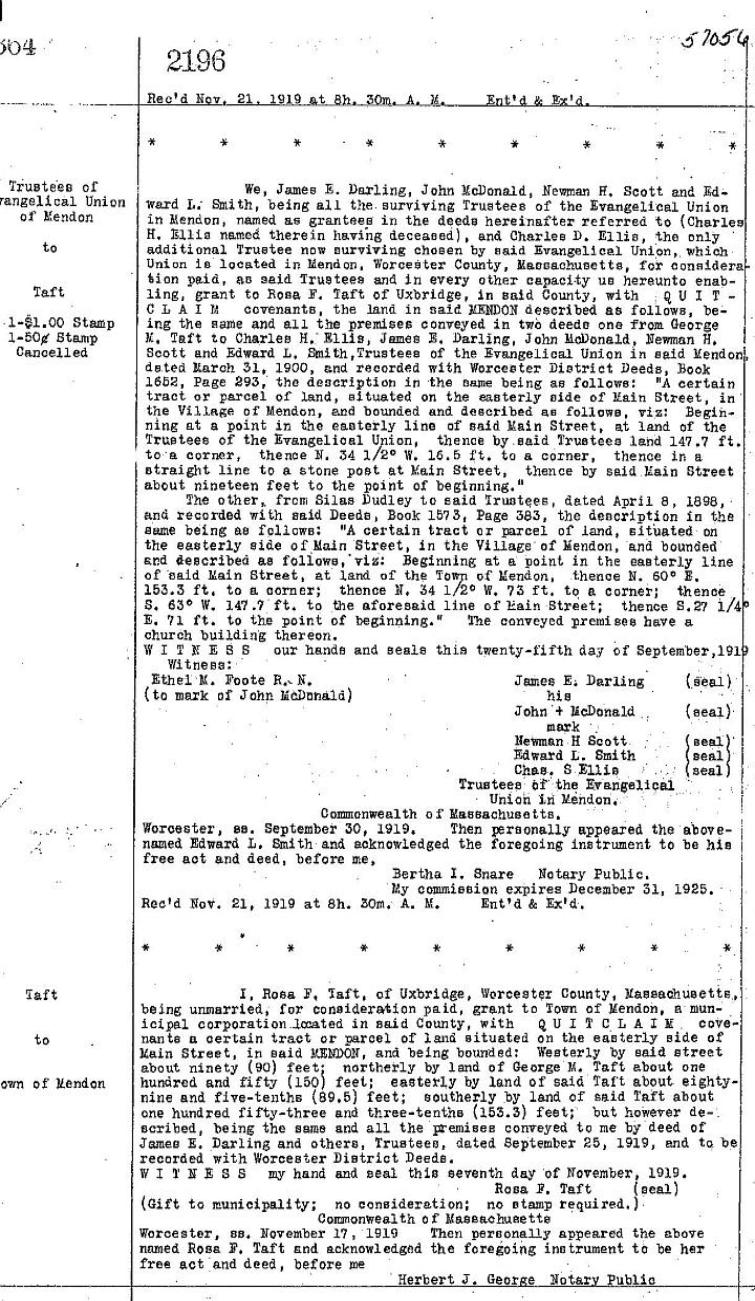

Two Women from Different Childhood Backgrounds; In Later Life They Were Bookends Two women who were born in Mendon in the 1800's grew up in different backgrounds, yet in later years, they shared a common bond that would affect the people of their community for many years to come. As children, they were from drastically diverse circumstances in terms of wealth and education, but as adults, they both had been inspired by beloved family members who influenced their lives in meaningful ways. To honor their memories, they donated gifts that contributed significantly to the cultural well- being of the town. Susan Lee's childhood was devastating and sad. Her father, Ephraim Lee, was a shoemaker, and her mother, Abigail "Nabby" (Benson) Taft Lee, was a widow with a previous child. Nabby died when Susan was four months old, and her father died when she was four years old. The orphaned little girl was sent to live with her uncle and aunt: Jared and Sally Taft Benson. They lived on a farm in the Chestnut Hill section of Mendon. Her half brother, William Putnam Taft, was sent to Worcester. Rosa George was from a family of privilege. She grew up in the federal farmhouse at 28 Main Street. Her family was well educated and wealthy. She and her sisters graduated from Wellesley College. Her father and grandfather had degrees from Brown University, and her brothers were graduates of Harvard. One of her sisters taught at MIT, another at Wellesley, and the other was school superintendent in Mendon. The Georges were successful educators, businessmen, town officials, and farmers. It would seem that Susan and Rosa had very little in common. It was not until later in their lives, that there appeared to be common links. Susan married William Huston in 1847 at the age of 23. They moved to Providence, and she became a seamstress. Rosa married Arthur R. Taft of Uxbridge in 1889. He was a prominent banker and public official. Though they were from different financial and educational backgrounds, their common links were that they shared an avid interest in literature, and that Susan, Rosa, and Arthur had family ties to Robert and Sarah Taft of Mendon. William Putnam Taft had been a literary inspiration to his younger half-sister, Susan. Living in Worcester, he did not get to visit with her often, but his visits generally involved the discussion of books. In his later years, in 1872, he was in the process of donating $3,000 for the creation of a library for the town of his boyhood home. However, he died suddenly, and instead, the money was inherited by Susan and her two siblings. She used her share to fulfill her brother's dream. She donated $1,000 for the establishment of a library, with one of the stipulations being that it be named in memory of her brother. The new Taft Public Library opened in 1881. It was located at 3 Main Street at the brick building that had been used previously as Seth Hastings' bank, a law office, a private school, a residence, and a place to store town documents. Arthur R. Taft, besides being a successful banker, businessman, and public official, was a life trustee of the Uxbridge Public Library and an avid reader. He died in 1914, just about the same time that the congregation of the Evangelical Union Chapel had dwindled to the point where the building was rarely used. It coincidently was a time in which the volumes of books at the library had exceeded the confines of the limited space provided by the brick building. Taking the opportunity to honor her husband and to help out the town, she purchased the building in 1919 and donated it to the people of Mendon. She also donated a substantial sum for its renovation and maintenance. Arthur's devotion to literature, like that of his cousin William, would be acknowledged and memorialized. Susan Lee Huston and Rosa George Taft paid tribute to two beloved members of Mendon's highly respected Taft family. A love of reading and a devotion to cherished family members brought about a common bond that created and expanded the Taft Public Library. Though from diverse childhood experiences, Susan and Rosa shared a unified virtue of philanthropy and created opportunities for future generations to share their love of reading. Richard Grady June 5, 2012 President Taft Visits Mendon and Hopedale . |




Lydia Taft Early life and Marriage to Josiah Taft By David Willis, III Lydia Chapin was born in Mendon, Worcester County, Massachusetts on 2 February 1712. She was the daughter of Seth Chapin, and Bethia Thurston. Seth Chapin was a respected member of the community and a Captain in the militia. Young Lydia Chapin grew up in Mendon, in a large family with nine siblings. Lydia's mother had 14 children. Her father Seth owned much property in what is today Milford, south Hopedale and Posts Lane in Mendon. Untimely Death Opened The Door America's History of Women's Suffrage Given the important nature of the vote, the landowner and taxpayer status of Josiah's estate, and the fact that young Bazaleel, Caleb's younger brother, was just a minor, the townspeople voted to allow Lydia, "the widow Josiah Footnote of Historic Vote The complete footnote of local history is as follows: "The October 25 town meeting records simply say that on account of Josiah's death a new moderator will be chosen. With the death of Josiah, Lydia is left to care for 16-year-old Asahael, 6-year-old Bezaleel and 3- In the fall of 1756, Josiah and Lydia's 18 year old son, Caleb, became ill, while studying at Harvard, and died on September 19. Josiah went to Boston and Cambridge to bury Caleb. Josiah himself became ill after returning home, and died on September 30, at age 47. It was reported that he left a good estate with bonds and a will. This was immediately prior to an important vote on the town's support for the war effort in the French and Indian Wars. Josiah's untimely death opened the door for Lydia's step into America's history of women's suffrage. Josiah Taft was originally known as Ensign Josiah Taft in the Uxbridge Militia, and later as Lieutenant, and then Captain Josiah Taft in the French and Indian War. He presided over the proceedings of the New England style open town meeting. It is later reported, that Josiah Taft became the largest taxpayer in the town of Uxbridge in 1756. Taft", to vote in this important meeting. Lydia then received Josiah's proxy to vote in this important town meeting. Lydia Chapin Taft then became the first recorded legal woman voter in America. Lydia Chapin Taft, now simply known as Lydia Taft, voted in an official New England Open Town Meeting, at Uxbridge, Massachusetts, on October 30, 1756. This is recorded in the records of the Uxbridge Town Meeting. Lydia Taft of Uxbridge became the first woman to ever vote in the nation. The early town records demonstrate at least two other occasions when Lydia voted in official Uxbridge Town meetings, both in 1758 and again in 1765. This occurred while Massachusetts, was a colony of Great Britain. Lydia Chapin Taft's historic vote and her role in the history of women's suffrage is recognized by the Massachusetts legislature since 2004, which named Massachusetts Route 146A from Uxbridge to the Rhode Island border in her honor. The record shows that Lydia Chapin Taft was America's first legal woman voter. Lydia Taft died I(aged 65) at Uxbridge in 1778, shortly after U.S. independence. year-old Cloa. As seems to be her fate, her life and the life of her town are again intertwined. The French and Indian war is being waged and towns must vote as to whether to increase the amount they will contribute to the cost of the war. The only individuals allowed to vote were freeholders, (free male property holders), and Josiah's estate was valued as one of the largest in the town. Out of respect for his large contribution to the town, the town fathers allowed Lydia to vote as Josiah's proxy. She cast a vote to increase the town's contribution, thereby giving herself the distinction of being the first woman to vote in this country. She is mentioned in town records a few times more, once in 1758 to reduce her highway rates and another in 1765 was to change her school district." Her vote was in favor of appropriating funds for the regiments engaged in the French and Indian War. November 8, 2012 6th Period In 1727 the western part of Mendon became the newly incorporated town of Uxbridge. Mendon and Uxbridge were at that time rural communities in central Massachusetts. The reference cited also mentions that she married a Taft. In 1731, these communities became part of the new county of Worcester County. http://prezi.com/kmnuz5sluqzy/womens-suffrage- presentation-project-lydia-taft/ |
